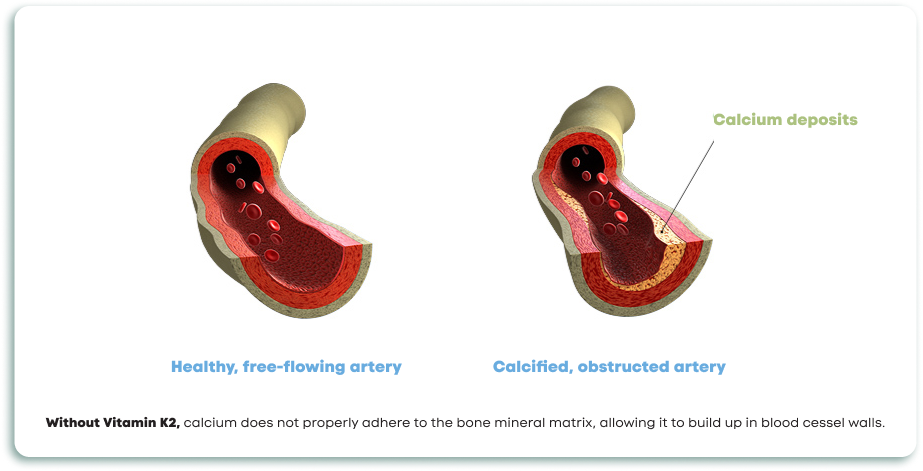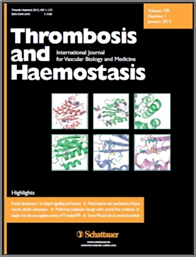Cardiovascular Health

An adequate intake of Vitamin K2 has been shown to positively influence the cardiovascular system.
Calcification was once believed to be an irreversible process and a result of aging. However, it is now known that calcium accumulation is an actively regulated process involving the vitamin K-dependent Matrix Gla Protein (MGP), the most potent inhibitor of vascular calcification known, which is actively involved in recycling calcium.
Healthy arterial tissues have shown to contain 100 times more Vitamin K2 than unhealthy arteries, and the amount of calcium in the arteries is a risk factor for cardiovascular health. One might say that “you are as old as your arteries.” Studies in large population groups show that significant calcification in young persons actually make them older than their chronological age. On the contrary, older persons with little or no calcification may deduct up to 10 years from their actual age.
The Rotterdam Study (2004) shows that high dietary intake of Vitamin K2 – but not vitamin K1 – has a strong protective effect on cardiovascular health. Findings from this 10-year population-based study, which followed 4,807 initially healthy men and women >55 years of age from start, indicate that eating foods rich in natural Vitamin K2 (at least 32 mcg/day) results in 50% reduction of arterial calcification, 50% reduction of cardiovascular risk, and 25% reduction of all-cause mortality.
In 2008, these findings were confirmed by another population-based study with 16,000 persons from the Prospect-EPIC cohort population. Female participants aged 49-70 years at the start of the study, were followed up for 8 years and were free of cardiovascular diseases at the baseline. The researchers found that for every 10mcg Vitamin K2 (MK-7, MK-8, and MK-9) consumed – not K1 – the risk of coronary heart disease was reduced by 9%.
Unfortunately, the Western diet does not contain sufficient Vitamin K2, so supplementing with MenaQ7® Vitamin K2 as MK-7 is a viable alternative recommended by experts.

Breakthrough MenaQ7® Cardiovascular Study
Findings from a large clinical study, published in Thrombosis and Haemostasis, signal Vitamin K2 as MK-7 as a potential game-changer for the cardiovascular health category. Scientists at the University of Maastricht (the Netherlands) performed a double-blind, randomized, intervention study of 244 postmenopausal women given either 180 mcg of Vitamin K2 as MK-7 (as MenaQ7®) or a placebo daily for 3 years.
Using ultrasound and pulse-wave velocity measurements (recognized as standard measurements for cardiovascular health), researchers determined that carotid artery distensibility was significantly improved for a 3-year period in the MenaQ7® group as compared with that of a placebo group, especially in women having high arterial stiffness. Also, pulse-wave velocity showed a statistically significantly decrease after 3 years for the Vitamin K2 (MK-7) group, but not for the placebo group, demonstrating an increase in the elasticity and reduction in age-related arterial stiffening, again, especially in women having high arterial stiffness.
This first intervention trial on MK-7 supplements and cardiovascular endpoints showed that 3-year supplementation with a daily, nutritional dose (180 mcg) of MenaQ7® was enough to actually decreased arterial stiffness in healthy post-menopausal women.
And now a new 1-year trial has published – this time examining the impact of K2 supplementation (as MenaQ7®) on male and female populations – confirming cardiovascular benefits.
A pre-selected group of 243 vitamin K-insufficient subjects (men and women) were randomly included in a placebo-controlled, double-blind 1-year supplementation study using non-invasive diagnostic method evaluating whether an effect of vitamin K2-supplementation (180 μg MK-7 as MenaQ7®) may be demonstrated within one year.
Arterial stiffness was concluded from the carotid-femoral pulse-wave velocity (cfPWV), and other vascular characteristics were measured by echotracking of the common carotid artery. In the total study group, MK-7 induced a significant decrease of both dp-ucMGP and cfPWV.
It was concluded that high vitamin K intake decreased age-related vascular stiffening (consistent with outcomes in two previous 3-year studies), but this is the first time that vascular effect was observed within one year of treatment.

MenaQ7® is featured in quality products around the globe.

